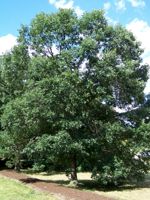Mon-Fri 9am - 5pm Mountain time
Frank Hazelnut vs Swamp White Oak
Corylus avellana Frank
Quercus bicolor
NOT AVAILABLE THIS SEASON - MIGHT RETURN
NOT AVAILABLE THIS SEASON - MIGHT RETURN
The Frank Hazelnut produces nuts that are medium size and ripen mid August. This is one of the best eating hazelnuts for cold climates. It is a medium size deciduous tree from Saskatchewan, Canada. It is a productive tree that has been tested as both a pollinizer and a main crop cultivar for colder climates. The Frank Hazelnut is one of the cold hardiest hazelnut trees on the market and known to be resistant to eastern filbert blight.
Not all hazelnuts pollinate with each other so it is important to pick the correct pollination pairs. Two compatible varieties of hazelnut are required to produce nuts. Nuts will only be produced once maturity is reached, around 2-3 years.
The Swamp White Oak is a medium-sized deciduous tree native to North America. It is commonly found in swamps, lowlands, floodplains, and near streams and lakes. The leaves are two-toned, green on top and silvery-white on the undersides, adding to the visual appeal of this popular shade tree.
In the fall, the Swamp White Oak produces acorns which are an important food source for wildlife. It also provides a habitat for the larvae of many butterfly and moth species, playing an important ecological role. Although its growth is slow in the first few years, once the roots are established, it can achieve faster annual growth.
Frank Hazelnut Quick Facts
Swamp White Oak Quick Facts
Toxicity: mildly toxic to humans, cats, and dogs

